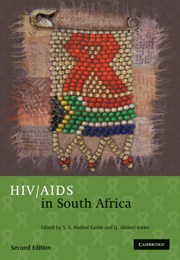Book contents
- Frontmatter
- Contents
- List of Contributors
- Foreword: Peter Piot
- Foreword: Nelson R Mandela
- Acknowledgements
- Section 1 Birth of a rapidly growing epidemic
- Section 2 The virus, the human host and their interactions
- Section 3 HIV risk factors and prevention strategiess
- Section 4 Focal groups for understanding the HIV epidemic
- Section 5 The impact of AIDS
- 21 Impact of AIDS – the health care burden
- 22 The impact of AIDS on the community
- 23 The impact on ethics
- 24 The economic impact of AIDS
- 25 AIDS-related mortality in South Africa
- 26 Picking up the pieces: the end of AIDS denialism and its aftermath
- Section 6 Treating HIV
- Section 7 What does the future hold?
- Index
21 - Impact of AIDS – the health care burden
Published online by Cambridge University Press: 07 September 2011
- Frontmatter
- Contents
- List of Contributors
- Foreword: Peter Piot
- Foreword: Nelson R Mandela
- Acknowledgements
- Section 1 Birth of a rapidly growing epidemic
- Section 2 The virus, the human host and their interactions
- Section 3 HIV risk factors and prevention strategiess
- Section 4 Focal groups for understanding the HIV epidemic
- Section 5 The impact of AIDS
- 21 Impact of AIDS – the health care burden
- 22 The impact of AIDS on the community
- 23 The impact on ethics
- 24 The economic impact of AIDS
- 25 AIDS-related mortality in South Africa
- 26 Picking up the pieces: the end of AIDS denialism and its aftermath
- Section 6 Treating HIV
- Section 7 What does the future hold?
- Index
Summary
AS THE LEADING CAUSE of illness and death in sub-Saharan Africa, HIV and AIDS have become an added burden on already strained health care systems. The full extent is not yet apparent because of the latent period between infection and illness and death. Data on the effect of AIDS on health care systems are scarce, most studies being small and cross-sectional.
The main impact on adult health services appears to be increased hospital admissions, leading to ward overcrowding and possible exclusion of hiv-negative patients as a result. The increasing incidence of tb that accompanies hiv in southern Africa has also had an effect on hospital and other health care services. Increased mortality is seen in both patients infected with hiv and those who are not.
A disproportionate increase in the numbers of medical paediatric admissions against surgical admissions suggests that paediatric hiv is having an impact on paediatric health care services. Studies have found that hiv-positive children have more contact with health care services than those that are negative and mortality among those infected with hiv is consistently higher than among those who are not.
Treating intercurrent illness appears to be more costly among patients who are hiv positive than among those who are not infected. This was particularly the case for those co-infected with hiv and tb according to a study from Kenya.
- Type
- Chapter
- Information
- HIV/AIDS in South Africa , pp. 359 - 372Publisher: Cambridge University PressPrint publication year: 2010
- 1
- Cited by



